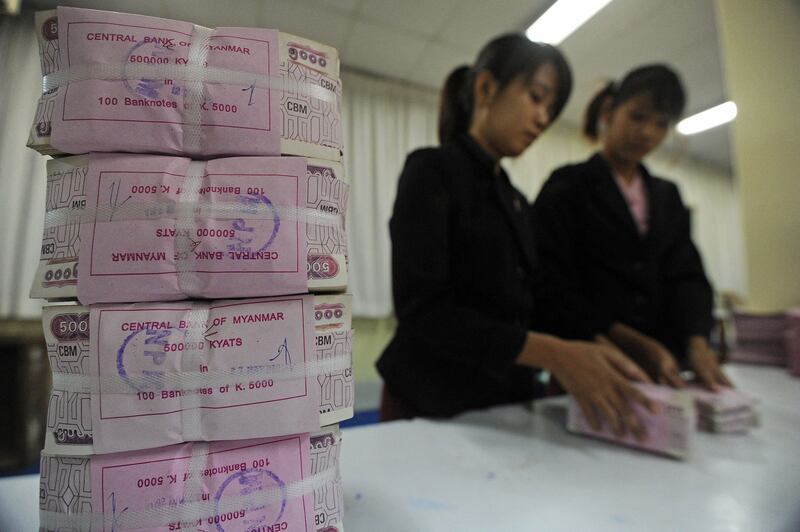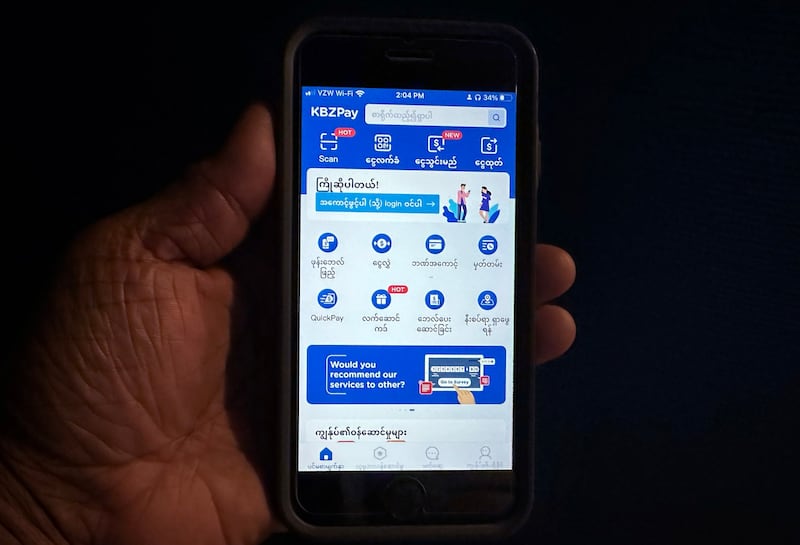Myanmar’s military regime has shut down more than 700 mobile bank accounts for allegedly funding anti-junta paramilitary groups in the month of May alone, according to data compiled by Radio Free Asia, industry insiders and account holders.
The move is the latest bid by the junta to cut off the flow of assistance to Myanmar’s armed resistance, which the military has vowed to eradicate in the aftermath of its Feb. 1, 2021, coup d’etat, but which has made increasing gains on the ground in key areas of the country.
An investigation by RFA Burmese found that last month the junta closed at least 721 accounts it accused of ties to anti-junta forces with mobile banking providers including KBZPay, WavePay, AYAPay, and CBPay. The junta shuttered similar bank accounts prior to May, although the number was not immediately clear.
Account holders who were locked out of their accounts told RFA that the military had ordered Myanmar’s Central Bank to monitor “irregular” money transfers and deposits and to crack down on associated accounts.
While some of the closed accounts may have been used by individuals funneling money to anti-junta organizations including the People’s Defense Force paramilitary group and shadow National Unity Government, others belonged to ordinary civilians running small businesses, some of those affected said Friday.

Yangon resident Wai Oo said his KBZPay account, which he opened in 2019 to run his online shopping business, was closed by the junta last week with nearly 2 million kyats (US$950) still in it. He said he went to his bank to explain the mistake, but was forced to leave without his money or account reinstated.
“If they want to cut off support to the PDF, they should do their due diligence first,” he said. “Online shopping businesses like mine make bank transactions on a daily basis and they should investigate them more carefully. We are being hurt by this baseless closure of our accounts.”
Amar Myint, a woman from Monywa, also had her KBZPay account frozen on the order of the central bank with no explanation given, even though she only used it for regular banking activities.
“I’m just an ordinary citizen who minds her own business and I don’t get involved in any complicated activities,” she said, adding that she mostly used her account to pay for her internet access and shop online. “When I talked to the bank, they didn’t say anything beyond that they were instructed to do so by the central bank.”
Transactions monitored daily
RFA also spoke with employees of private banks who said that, since the coup, they have had to report their institution’s online and mobile bank account transactions to the central bank on “a daily and monthly basis.”
“Among the accounts, those with at least 10 daily transactions and or that make transfers of 2 million kyats or more are monitored separately,” said an official at one bank who spoke on condition of anonymity, citing security concerns. “When an account is suspected of transferring money to other regions, they close the account permanently.”
Attempts by RFA to contact central bank officials regarding the closure of mobile bank accounts went unanswered Friday.

Junta Deputy Information Minister Major Gen. Zaw Min Tun said at a press conference in the capital Naypyidaw in September that the imposition of such strict rules was done to “prevent financial fraud and violence.”
Making lives difficult
Thein Tun Oo, executive director of the Thayninga Institute for Strategic Studies, a group formed by former military officers, told RFA that the account closures are key to protecting the nation from terrorism.
“If you look at it from a national security standpoint, it’s worrying that some huge amounts of money are transferred from one place to another for suspicious activities by using modern technology and no one can trace them,” he said. “If these transactions can’t be strictly controlled, the resistance groups will continue to receive support, which will lead to more rebellion and chaos for the people.”
But Sayar Kyaung, the leader of the anti-junta Yangon UG Association, said that the regime’s closing of mobile bank accounts impacts not only PDF groups but also the livelihoods of regular civilians.
“The junta knows that people will not be able to pay attention to the revolution if making ends meet becomes more and more difficult,” he said. “The junta is trying to cripple people’s businesses so that they will be less willing to support the revolution.”
Translated by Myo Min Aung. Edited by Joshua Lipes and Malcolm Foster.
